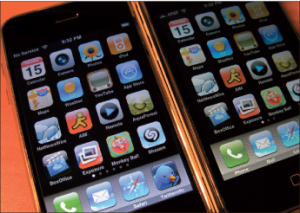Smartphones hindering intelligence

Debates rage over whether or not handheld devices are turning us into the generation with the weakest memory
In the moments before a class begins, they are on desks, in laps and cradled between palms. Whether texting a friend a few classrooms away, answering emails or perusing Facebook, students seize the minutes to put their technological arm to work, the smartphone.
Smartphones saturate all aspects of society on and off campus. Neilson Wire reported in July 2012 that more than 54 percent of United States mobile subscribers use smartphones. As our society has rapidly abandoned traditional cellphones for smartphones, we have become accustomed to constant connectivity and high levels of multitasking.
Due to the ongoing web of communication we have with one another, many wonder whether smartphones are crafting more productive or more distracted Americans. However, studies show that smartphones do not make more or less intelligent people.
Neuroscientist Gary Small, who wrote the book “iBrain: Surviving Technological Alteration of the Modern Mind,” offered his opinion on a link between smartphones and lowered intelligence.
“Direct systematic studies are either unavailable or I am unaware of them,” Small said.
Smartphones are simply tools that reveal the intelligence of the user.
Still, many insist that smartphones consistently drag people from the task at hand to a different priority or frivolity. However, as Forbes reported in September 2012, scientists who specialize in distraction studies have yet to prove that smartphones impair intelligence.
Rather than blaming the device for creating distracted students or employees, we should turn to the brain. Dopamine is the chemical in our brains that spikes when we experience a feeling of sensation. Technology may present us with minute-to-minute updates, but deciding what takes priority is still internal. Dealing with distractions is chiefly a personal responsibility, not the fault of a box of metals and wires.
Rather than inducing distractible, unproductive behavior, smartphones can enhance learning. Our smartphones can be a tool instead of a glorified toy. Carly Shuler, a researcher, developer and author in the children’s media and toy industry, insists that smartphone learning advantages outweigh disadvantages. Shuler presents innovative technology as a window for “anywhere, anytime learning.”
Smartphone manufacturers could not agree more with Shuler. The Apple App Store created “iTunes U” as a platform for learning “anything, anywhere, anytime.” The application allows students of any age to access classes, lectures and books by authorities on hundreds of subjects. Smartphones are filled with the opportunity to utilize capabilities far beyond just tweeting and texting.
On the other hand, the Apple App Store offers plenty of just-for-fun applications. Facebook and Instagram, as well as gaming applications such as Angry Birds, are routinely in the top 10 applications of the day. While these applications do not directly enhance education, they are an invaluable source of communication and entertainment. The amount of time spent on social and gaming applications is far more problematic than the games themselves.
For the college student with a smartphone, the device can be a time enhancer or waster. Our technological arm will take us in either direction, but the smartphone will not be to blame in the end. When the professor enters the room and students hide away their smartphones, the intelligence of the user will be laid bare.

